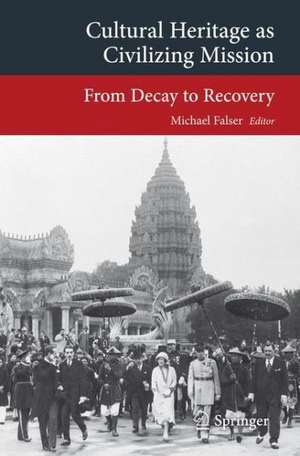Cultural Heritage as Civilizing Mission: From Decay to Recovery: Transcultural Research – Heidelberg Studies on Asia and Europe in a Global Context
Editat de Michael Falseren Limba Engleză Paperback – 25 mar 2015
The themes examined range from architectural and intellectual history to historic preservation and restoration. Taken together, they offer an overview of historical processes spanning two centuries of institutional practices, wherein the concept of cultural heritage was appropriated both by political regimes and for UNESCO World Heritage agendas.
Din seria Transcultural Research – Heidelberg Studies on Asia and Europe in a Global Context
- 18%
 Preț: 948.92 lei
Preț: 948.92 lei - 18%
 Preț: 1216.48 lei
Preț: 1216.48 lei - 15%
 Preț: 637.59 lei
Preț: 637.59 lei - 15%
 Preț: 636.80 lei
Preț: 636.80 lei - 18%
 Preț: 939.46 lei
Preț: 939.46 lei - 15%
 Preț: 648.24 lei
Preț: 648.24 lei - 15%
 Preț: 639.25 lei
Preț: 639.25 lei - 15%
 Preț: 643.34 lei
Preț: 643.34 lei - 15%
 Preț: 640.55 lei
Preț: 640.55 lei - 18%
 Preț: 889.75 lei
Preț: 889.75 lei - 15%
 Preț: 649.54 lei
Preț: 649.54 lei -
 Preț: 419.06 lei
Preț: 419.06 lei - 15%
 Preț: 632.52 lei
Preț: 632.52 lei -
 Preț: 386.99 lei
Preț: 386.99 lei - 15%
 Preț: 636.30 lei
Preț: 636.30 lei -
 Preț: 387.75 lei
Preț: 387.75 lei -
 Preț: 363.52 lei
Preț: 363.52 lei - 15%
 Preț: 644.18 lei
Preț: 644.18 lei - 18%
 Preț: 897.14 lei
Preț: 897.14 lei - 18%
 Preț: 779.57 lei
Preț: 779.57 lei - 15%
 Preț: 584.10 lei
Preț: 584.10 lei - 15%
 Preț: 588.37 lei
Preț: 588.37 lei
Preț: 784.61 lei
Preț vechi: 956.84 lei
-18% Nou
Puncte Express: 1177
Preț estimativ în valută:
150.18€ • 163.19$ • 126.23£
150.18€ • 163.19$ • 126.23£
Carte tipărită la comandă
Livrare economică 21 aprilie-05 mai
Preluare comenzi: 021 569.72.76
Specificații
ISBN-13: 9783319136370
ISBN-10: 3319136372
Pagini: 320
Ilustrații: X, 355 p. 137 illus., 65 illus. in color.
Dimensiuni: 155 x 235 x 25 mm
Greutate: 0.52 kg
Ediția:2015
Editura: Springer International Publishing
Colecția Springer
Seria Transcultural Research – Heidelberg Studies on Asia and Europe in a Global Context
Locul publicării:Cham, Switzerland
ISBN-10: 3319136372
Pagini: 320
Ilustrații: X, 355 p. 137 illus., 65 illus. in color.
Dimensiuni: 155 x 235 x 25 mm
Greutate: 0.52 kg
Ediția:2015
Editura: Springer International Publishing
Colecția Springer
Seria Transcultural Research – Heidelberg Studies on Asia and Europe in a Global Context
Locul publicării:Cham, Switzerland
Public țintă
ResearchCuprins
Cultural Heritage as Civilizing Mission. An Introduction.- Part I: Direct Neighbours and the Primitive.- Colonialism without Colonies: The Civilizing Missions in the Habsburg Empire.- German Colonialism and the Formation of African Heritage.- Part II: Civilizing Missions (post)colonial.- Between the Colonial, the Global, and the Local––Civilizing India’s Past under Different Regimes.- Save Borobudur! The Moral Dynamics of Heritage Formation in Indonesia across Orders and Borders, 1930s–1980s.- Part III: From Cultural Brokers to Enlightened Dictators.- Decadence and Revival in Cambodian Arts and the Role of George Groslier (1887–1945).- The Civilizing Vision of an Enlightened Dictator: Norodom Sihanouk and the Cambodian Post-Independence Experiment (1953–1970).- Part IV: Archaeological Pasts for Revolutionary Presents.- Make the Past Serve the Present: Reading Cultural Relics Excavated during the Chinese Cultural Revolution of 1972.- The Myth of Angkor as an Essential Component of the Khmer Rouge Utopia.- Part V: Making Cultural Heritage Global.- Representing Heritage without Territory––The Khmer Rouge at the UNESCO in Paris During the 1980s and their Civilizing Mission for Angkor.- Discourses and Practices between Traditions and World Heritage Making in Angkor.- Epilogue: Paving the Way towards Civilization: 150 Years of Saving Angkor.
Textul de pe ultima copertă
This book investigates the role of cultural heritage as a constitutive dimension of different civilizing missions from the colonial era to the present. It includes case studies of the Habsburg Empire and German colonialism in Africa, Asian case studies of (post)colonial India and the Dutch East Indies/Indonesia, China and French Indochina, and a special discussion on 20th-century Cambodia and the temples of Angkor.
The themes examined range from architectural and intellectual history to historic preservation and restoration. Taken together, they offer an overview of historical processes spanning two centuries of institutional practices, wherein the concept of cultural heritage was appropriated both by political regimes and for UNESCO World Heritage agendas.
The themes examined range from architectural and intellectual history to historic preservation and restoration. Taken together, they offer an overview of historical processes spanning two centuries of institutional practices, wherein the concept of cultural heritage was appropriated both by political regimes and for UNESCO World Heritage agendas.
Caracteristici
The first trans-disciplinary insight into the concept of 'cultural heritage' within the intellectual history of 'civilizing missions' from colonial to postcolonial and today's globalized times A unique compilation of case studies from the Habsburg Empire to German colonialism in Africa, to South and Southeast Asia (including the sites of Borobudur and Angkor) and China Offers a wide range of impressive illustrations from different historical and current media, ranging from colonial press and photography to UNESCO World Heritage material









